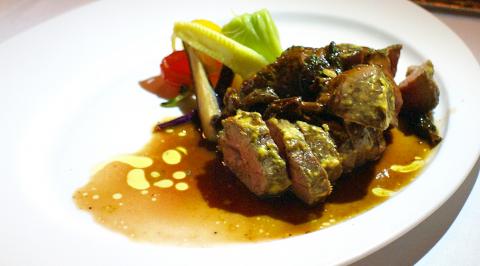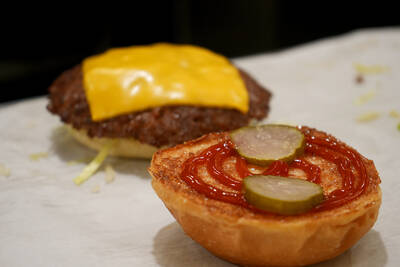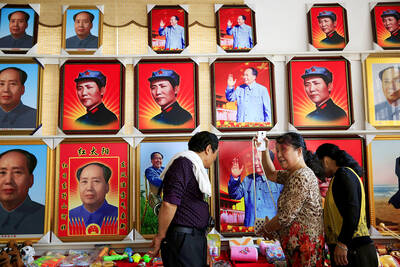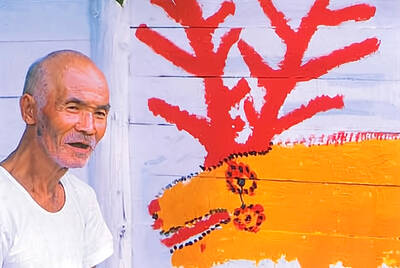Jay Chou’s (周杰倫) restaurant Deja Vu, I thought to myself as I entered it last weekend, will probably follow one of two trajectories, much the same way his career in the entertainment industry has. It will either be a resounding success like the pop music that has made him a household name, or it will be a dud like Pandamen (熊貓人), the television drama he directed that was universally panned by critics and audiences because of its goofy premise and trite plot.
Opened last summer in Huashan 1914 Creative Park (華山1914), Deja Vu at first feels like a finely crafted work of art. With its vaulted arcades supported by stone columns and exposed cement walls adorned with framed paintings of landscapes and portraits of renowned composers, it is immediately appealing. As you move further in, however, it’s Pandamen all the way. The oil paintings are in fact posters and the sumptuous architectural flourishes are offset incongruously by Chou’s gigantic Batmobile, its black surface reflecting the interior’s kaleidoscope of crass disco lighting.
Sure, the Batmobile is sleek and cool and something you’ve probably never seen before, but a car doesn’t belong in the center of a dining room. During my visit, several amateur photographers went up to snap the auto (this reviewer included), bumping chairs and setting off flashbulbs in the process.

Photo: Noah Buchan, Taipei Times
Kitschy movie set production values aside, our party of nine was still prepared to give the service and food the benefit of the doubt. And like the design, the service started out well.
When our party ordered the seafood pizza (NT$480), our server, dressed in formal black, suggested another dish because we had already ordered the seafood risotto (NT$680 for two), which contains similar ingredients. For the first 15 minutes, or so, our water glasses remained full. But when asked if the pasta with clams contained white wine, our server said she didn’t know and she didn’t bother to check. After our main courses were served, our water glasses were not filled up. That was disappointing because the dishes were over-seasoned with salt. This was especially true of the potato and sausage pizza (NT$360) and spaghetti with garlic and clams (NT$420). Both were presented beautifully, but the thin-crust pizza was flavorless and soggy. The pasta, cooked to al dente perfection, contained too much garlic, which overpowered the subtler flavor of the clams.
For many of the dishes, we wondered what we were paying for. The portions of the tapas for two (NT$420), with its array of smoked salmon, foie gras, salami, seasoned octopus and pickled artichoke and garlic, were laughably small and it was obvious that much of it had come from a packet.
Whereas the pizza and pasta left us pining for water, the oven-baked lamb with herb and mustard wine sauce (NT$780) barely registered on the taste buds. The meat was baked to a rosy red hue and tastefully arranged on the plate, but the sauce was bland and the vegetable portions a miniscule and overcooked afterthought. The seafood risotto is the only dish I would consider ordering again. With its generous portions of scallops, shrimp, clams and crabmeat cooked in a buttery white wine sauce, it was a unanimous favorite.
Deja Vu seems to be playing off the fame of its owner. Go for the car, but not the food.

Taiwan can often feel woefully behind on global trends, from fashion to food, and influences can sometimes feel like the last on the metaphorical bandwagon. In the West, suddenly every burger is being smashed and honey has become “hot” and we’re all drinking orange wine. But it took a good while for a smash burger in Taipei to come across my radar. For the uninitiated, a smash burger is, well, a normal burger patty but smashed flat. Originally, I didn’t understand. Surely the best part of a burger is the thick patty with all the juiciness of the beef, the

The ultimate goal of the Chinese Communist Party (CCP) is the total and overwhelming domination of everything within the sphere of what it considers China and deems as theirs. All decision-making by the CCP must be understood through that lens. Any decision made is to entrench — or ideally expand that power. They are fiercely hostile to anything that weakens or compromises their control of “China.” By design, they will stop at nothing to ensure that there is no distinction between the CCP and the Chinese nation, people, culture, civilization, religion, economy, property, military or government — they are all subsidiary

Nov.10 to Nov.16 As he moved a large stone that had fallen from a truck near his field, 65-year-old Lin Yuan (林淵) felt a sudden urge. He fetched his tools and began to carve. The recently retired farmer had been feeling restless after a lifetime of hard labor in Yuchi Township (魚池), Nantou County. His first piece, Stone Fairy Maiden (石仙姑), completed in 1977, was reportedly a representation of his late wife. This version of how Lin began his late-life art career is recorded in Nantou County historian Teng Hsiang-yang’s (鄧相揚) 2009 biography of him. His expressive work eventually caught the attention

This year’s Miss Universe in Thailand has been marred by ugly drama, with allegations of an insult to a beauty queen’s intellect, a walkout by pageant contestants and a tearful tantrum by the host. More than 120 women from across the world have gathered in Thailand, vying to be crowned Miss Universe in a contest considered one of the “big four” of global beauty pageants. But the runup has been dominated by the off-stage antics of the coiffed contestants and their Thai hosts, escalating into a feminist firestorm drawing the attention of Mexico’s president. On Tuesday, Mexican delegate Fatima Bosch staged a